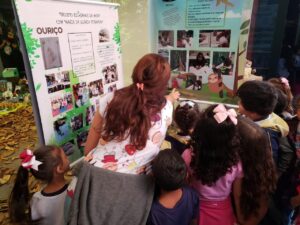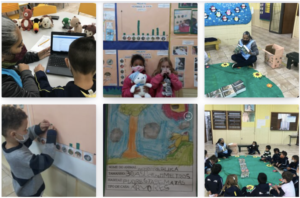News . Best Practices Protecting the animals of the largest urban forest of the world – From Genuity to Geniality in Early Childhood Education with open schooling

This good practice reports an open schooling initiative on THE ANIMALS OF THE URBAN FOREST developed in the city of Mairiporã, located in Serra Cantareira in the State of São Paulo, Brazil. Mairiporã is recognized for having the largest urban forest in the world. This project was promoted by the municipal secretary of education of Mariporã, which supported a large network of schools from February to September 2022. Activities included student interaction with the zoo professionals and scientists from the animal protection centre, access to the forest reserve website, including Youtube Videos about the animals. These specialists in the fields of biology, zoology, veterinary medicine, and others received students to discuss the real issues related to the problems that the community faces, such as what to do when they run into a forest animal in their backyard; who to contact if the animal is injured; what to do to protect the animals and preserve their natural habitat. The partnership for this open schooling initiative was supported by the Open University of the United Kingdom – responsible for teacher training to expand the knowledge and pedagogical practices related to open schooling, scientific capital and affective engagement to expand students´ connection with sciences. This practice was previously presented at several conferences, such as The Innovative Practices Seminar at the Open University, UK, in March 2022 and The Research and Innovation in Education with Technologies promoted by BETT in São Paulo, Brazil, in May 2022.
“CARE”: Approximately 650 students from Early Years Education, Elementary School, and Low Primary Education engaged in investigating a theme of their interest: the animals. They were concerned about those animals they found in their city, and even in their backyard, which were injured or lost from their natural habitat. Their interests engaged them in several activities involving the project. Many of them were led by their natural curiosity expressed in various questions addressed to the science professionals, and also in the conversations with their teachers and family. They learned science through a real-life problem involving their families and experts.
“KNOW “: Students learned about animal types and classification, names, and differences, including behaviour, habits, environment and food. In addition, students not only developed skills such as asking questions, drawing, writing, reflecting on school assessment, communicating their conclusions, but also experienced discussions about the voting system and data analysis through mathematics.
“DO”: At the end, students created drawings, posters, campaigns and infographics with maths data, games, and interviews with printed and online resources. They developed the activities individually and collaboratively with experts, family, and community members. At the end, all students discussed about their views related to science in their lives and society with the self-assessment mobile application CONNECT-SCIENCE tool.
Findings related to the Open Schooling approach: The structured activity allowed a connection with the curriculum in an interdisciplinary way. Children developed knowledge, skills, attitudes, and values with activities in science, mathematics, geography, and Portuguese language communication. It was a useful, relevant, challenging, and innovative project as it involved many schools and teachers who supported the actions with great commitment. Open schooling can be useful and challenging at the same time as it requires planning actions within and beyond the school space. That is why it is critical for teachers to have opportunities to receive mentorship and training with access to easy-to-use resources, practical teaching strategies, technology support and also an assessment tool to examine the results of their practices.
Student outcomes: Students demonstrated increased engagement, enjoyment of scientific activities, such as: observation in the forest and zoo; analysis and comparison of animal data sheets; discussion of concepts; communication skills, like oral, visual, and written competencies. As an example, one student mentioned that science is important and recorded a short video at home on her cell phone expressing her views on what science means to her. By the same token, other students manifested their learning and new knowledge by stating: “Science is not just about doing experiments in the lab; it helps us think about how to help the world”; “I learned about the characteristics of forest animals, types of habitats and how to protect them; “Deforestation is increasing, and we need to do something.”
Find out more here: Our report.
